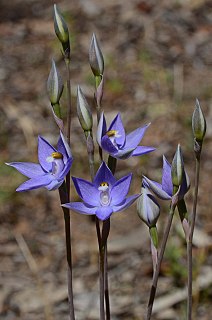
Thelymitra alcockiae, commonly called Kath's sun orchid, is a species of orchid that is endemic to southern continental Australia. It has a single long, narrow leaf and up to twelve pale blue to deep purplish blue flowers, mauve or reddish on their back side.
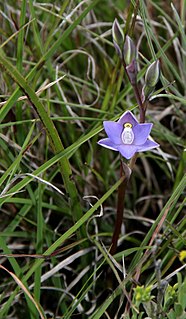
Thelymitra gregaria, commonly called the clumping sun orchid, is a species of orchid that is endemic to Victoria. It has a single fleshy, channelled leaf and up to six strongly scented, dark blue to purple flowers and often grows in clumps.
Thelymitra imbricata, commonly called the broad sun orchid, is a species of orchid that is endemic to Tasmania. It has a single erect, channelled leaf and up to fifteen or more pale to dark or purplish blue, relatively large flowers.
Thelymitra queenslandica, commonly called the northern sun orchid, is a species of orchid that is endemic to Queensland. It has a single long, grass-like leaf and up to fifteen dark blue to purplish, sometimes white or pinkish flowers with white or pink tufts on top of the anther. It is readily distinguished by its northerly distribution and early flowering period.
Thelymitra albiflora, commonly called the white sun orchid, is a species of orchid that is endemic to South Australia. It has a single erect, narrow, fleshy leaf and up to ten relatively small white flowers with white toothbrush-like tufts on top of the anther.
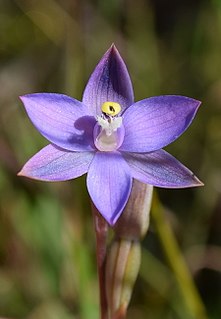
Thelymitra arenaria, commonly called the forest sun orchid, is a species of orchid that is endemic to south-eastern Australia. It has a single long, narrow leaf and up to sixteen purplish self-pollinating flowers which only open on hot days.
Thelymitra bracteata, commonly called the leafy sun orchid or large-bracted sum orchid, is a species of orchid that is endemic to south-eastern Australia. It has a single leathery, more or less flat leaf and up to thirty pale blue flowers that are greenish on the back. The bracts are larger than on similar sun orchids.
Thelymitra exigua, commonly called the short sun orchid, is a species of orchid that is endemic to south-eastern Australia. It has a single fleshy, channelled, dark green leaf and up to eight relatively small pale blue flowers with white toothbrush-like tufts on top of the anther.
Thelymitra cyanapicata, commonly called the dark-tipped sun orchid, is a species of orchid that is endemic to South Australia. It has a single fleshy, linear, channelled leaf and up to three small blue or pale purplish to maroon flowers with a dark purplish blue top of the anther.

Thelymitra granitora, commonly called the coastal granite sun orchid or coastal sun orchid, is a species of orchid in the family Orchidaceae and is endemic to the south-west of Western Australia. It has a single short, curved and channelled dark green leaf and up to eight relatively large pale blue or white, self-pollinating flowers with white mop-like tufts on the top of the anther.
Thelymitra pallidiflora, commonly called the pale sun orchid, is a species of orchid that is endemic to Victoria. It has a single erect, channelled, leaf and up to ten white to very pale blue, self-pollinating flowers which only open on hot days.
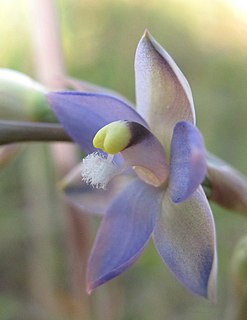
Thelymitra peniculata, commonly called the trim sun orchid, is a species of orchid that is endemic to southern eastern Australia. It has a single long, erect, fleshy, channelled leaf and up to eighteen deep blue to purple self-pollinating flowers.
Thelymitra planicola, commonly called the glaucous sun orchid, is a species of orchid that is endemic to southern eastern Australia. It has a single erect, leathery, channelled, dark green leaf and up to twelve blue flowers with darker veins. The plant has a bluish green hue and the flowers are self-pollinating, only opening widely on hot days.
Thelymitra viridis, commonly called the green sun orchid, is a species of orchid that is endemic to Tasmania. It has a single erect, fleshy, channelled leaf and up to seven small self-pollinating pale blue to pale purplish flowers. The rest of the plant is a pale green colour.
Thelymitra xanthotricha, commonly called the yellow tufted sun orchid or yellow tufted slender sun orchid, is a species of orchid in the family Orchidaceae and endemic to the south-west of Western Australia. It has a single erect, fleshy, channelled, dark green leaf and up to six relatively large dark blue to purplish flowers.
Thelymitra inflata, commonly called the inflated sun orchid, is a species of orchid that is endemic to south eastern Australia. It has a single long, erect, linear leaf and up to six dark blue to purplish flowers with a very inflated lobe on top of the anther.
Thelymitra lucida, commonly called the glistening sun orchid, is a species of orchid that is endemic to south eastern Australia. It has a single erect, fleshy leaf and up to seven dark blue flowers with the sepals a lighter blue than the petals.
Thelymitra kangaloonica, commonly called the Kangaloon sun orchid, is a species of orchid that is endemic to a very small area of New South Wales. It has a single erect, relatively narrow, fleshy leaf and up to forty deep blue flowers with darker veins.
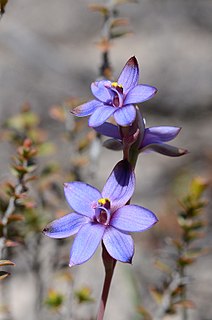
Thelymitra azurea, commonly called the azure sun orchid, is a species of orchid that is endemic to south-eastern Australia. It has a single fleshy, grass-like leaf and up to ten dark azure blue flowers with darker veins. The lobe on top of the anther has a toothed or warty tip.
Thelymitra jonesii, commonly called the skyblue sun orchid, is a species of orchid that is endemic to Tasmania. It has a single erect, fleshy, linear, dark green leaf and up to six relatively small light blue to azure blue flowers with darker veins. It is a rare orchid known from only four scattered locations in moist coastal heath.






